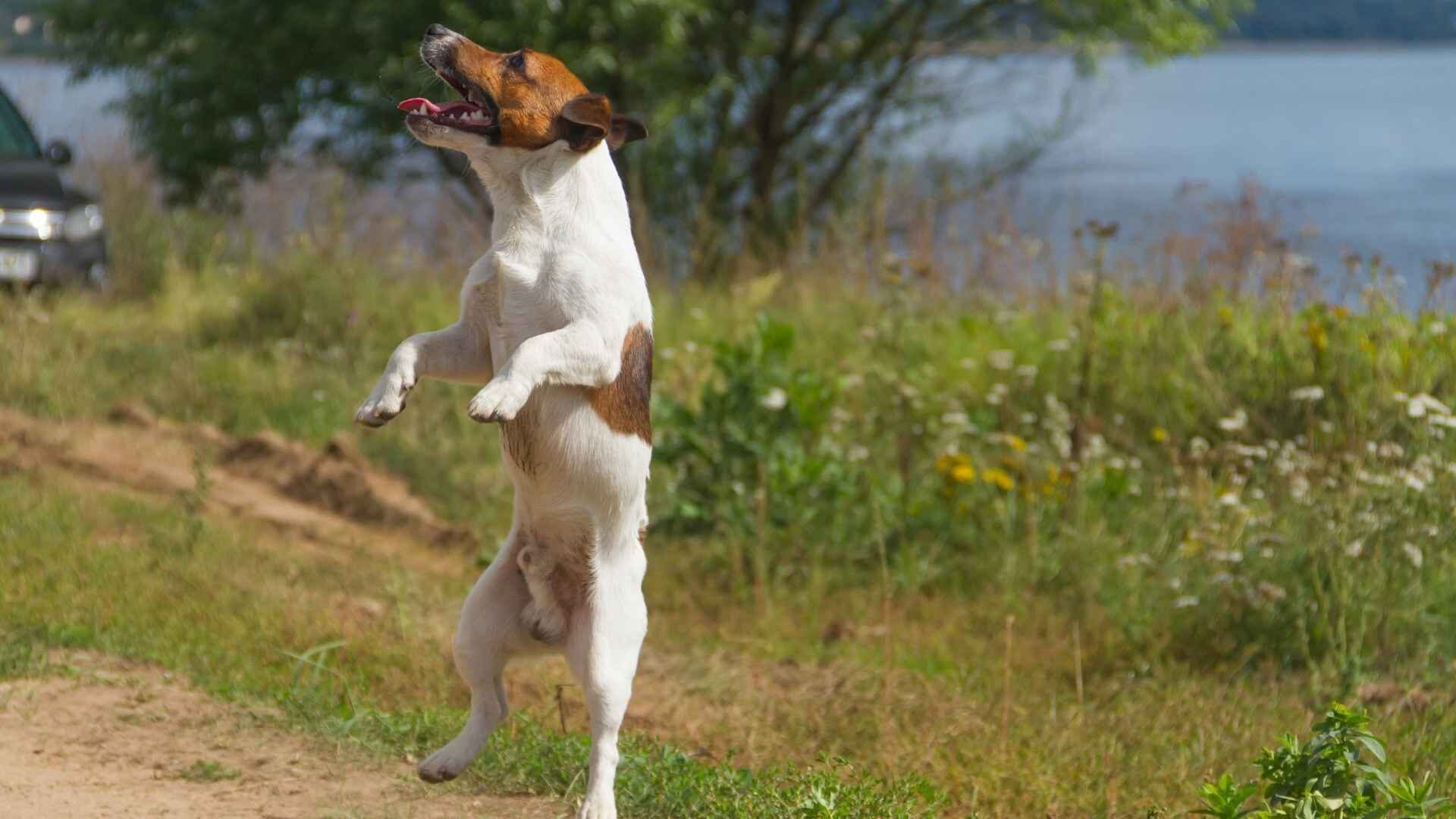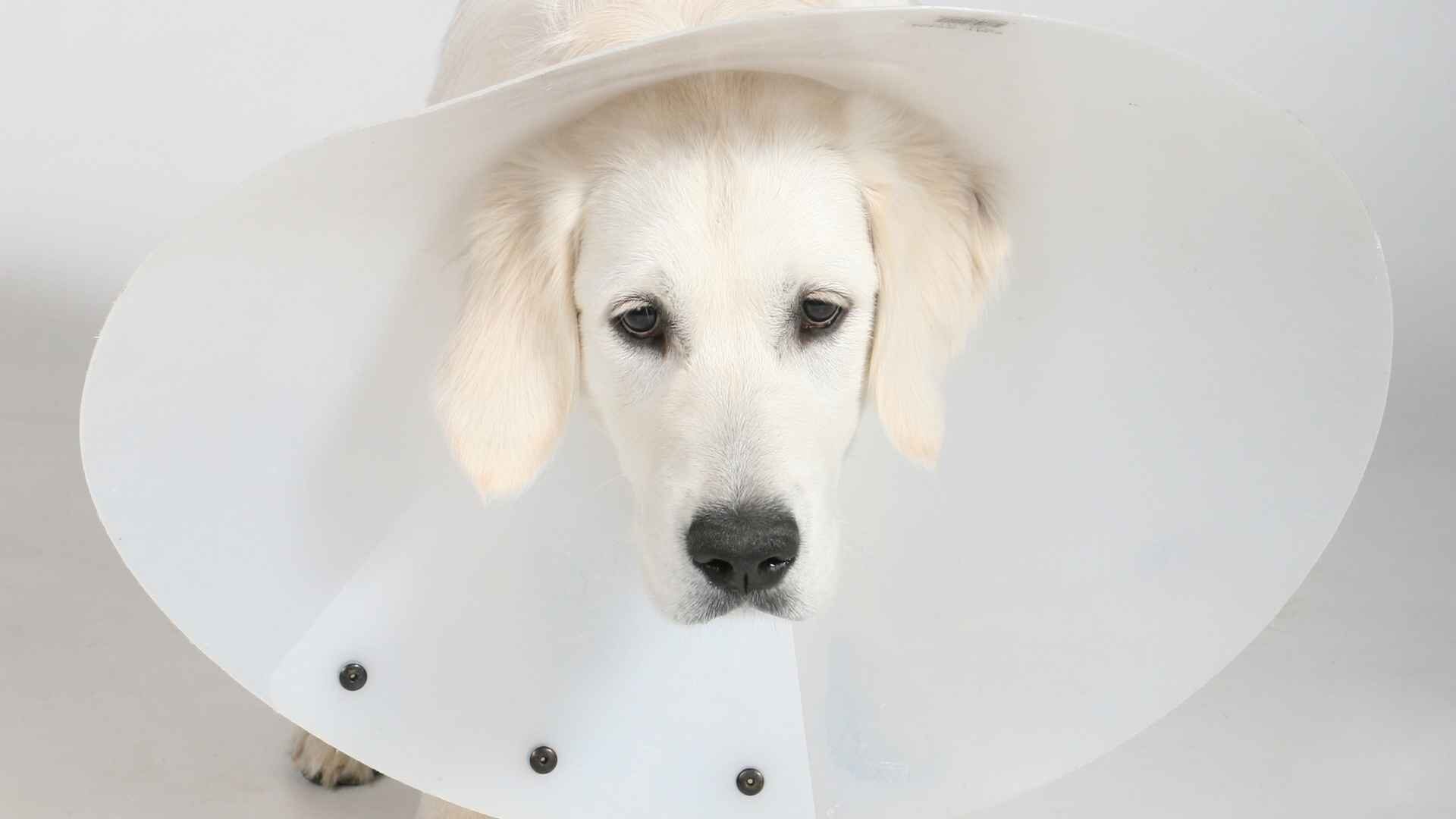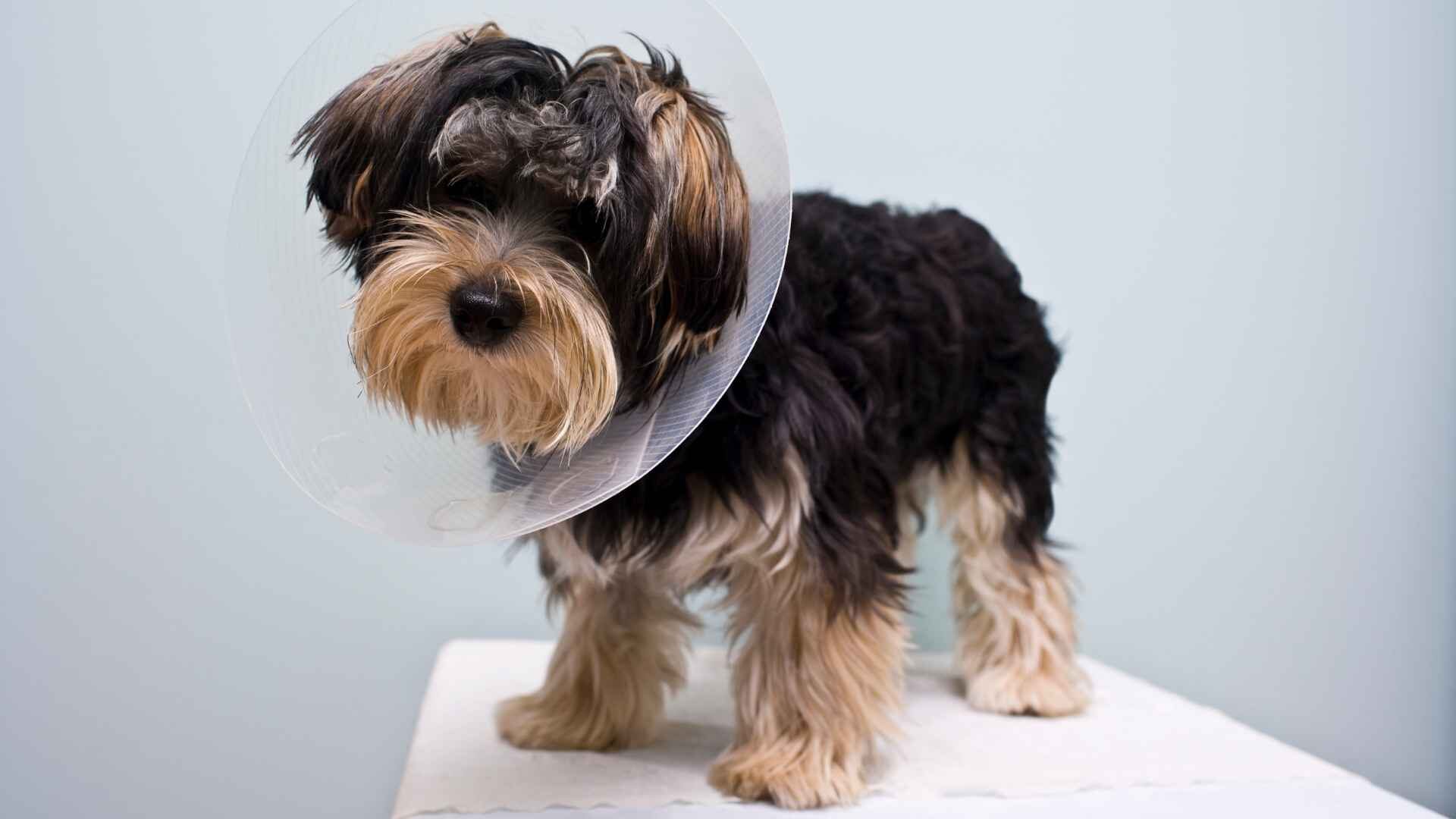Is your dog, after being neutered, becoming restless and exhibiting excessive jumping behavior? Keeping your dog from moving about too much after he or she has been neutered is crucial, as this will help prevent any issues from occurring in the surgical site.
Some possible causes of the dog’s bouncing behavior are discussed below. Your dog has to be in a quiet place first. You should avoid taking him somewhere that has a lot of distractions, like as a busy roadway, since it might prompt him to leap. When you can’t be there to oversee your dog, putting it in a crate may be the best option.
Second, provide your dog with a wide variety of toys that may be played with without a lot of physical activity on his part. Food-dispensing toys and chew toys are two examples. Nose-focused exercises are another excellent option. Finally, don’t forget to rub those hounds’ bellies! This may be quite soothing for canines and may help alleviate any pain or tension the dog might be feeling immediately after neutering.
What is spaying?

Spaying, sometimes known as “fixing,” is a surgical surgery in which a female dog has all or most of her reproductive organs removed. The terms “ovariectomy” and “ovariohysterectomy” refer to the two surgical methods used to sterilize female dogs. In an ovariectomy, just the ovaries are taken out.
Commonly referred to as a “spay,” an ovariohysterectomy involves the removal of both the uterus and the ovaries. The capacity of a female dog to enter heat and procreate is permanently removed by both methods. Standard practice in the United States and Canada calls for the removal of both ovaries and the uterus.
To perform a spay, general anesthesia is required. After inducing anesthesia, a breathing tube will be utilized to ensure that enough amounts of oxygen are being delivered to your dog’s lungs. Next, your vet will create a cut in your dog’s belly big enough to access the reproductive organs. Through this incision, your veterinarian will remove the ovaries and uterus (or only the ovaries, in the case of an ovariectomy) before closing your dog up with sutures.
Why shouldn’t my dog jump after being spayed?
Most likely, you’re thinking how soon you can let her resume her previous behaviors, such as leaping on the sofa or bed. All the information you’ll ever need is right here! Dogs recovering from spay surgery should not leap for 10-14 days. The incision has to heal completely at this point.
If the dog jumps too soon after getting sutures, the stitches may come out of the skin and need to be redone at the vet, not to mention creating other complications during the healing process. Also, during the first two weeks following surgery, your dog may be a bit shaky on her feet, making leaping a risky proposition that might result in her losing her balance and falling, which could lead to serious injuries.
Why my dog keeps jumping after being neutered?
It’s important to give your pet ten to fourteen days of rest and recovery after surgery. One of the restrictions placed on the patient is a prohibition on leaping for at least a week following surgery due to the risk of suture dislodgement, which might lead to further medical difficulties.
When male dogs are neutered, it’s not uncommon for them to become more aggressive than before. The neutering of a male dog may lead to a variety of undesirable side effects, including a rise in anxiousness and a heightened state of arousal.
1. Some kind of discomfort or pain has been detected by the dog
After a neutering treatment, the dog may be in a lot of pain and suffering, which might cause it to act erratically. The pain often only lasts for a few days. If discomfort persists for longer than that, you should contact the vet to be sure that the incision site has not developed any new issues.
2. Subsequently, drugs only have short-term effects
Before a neutering surgery, puppies are given an anesthetic or sedative. Your dog may not be acting like himself for a while after taking these medications, since their effects might last for many hours. Your dog will likely feel sleepy after taking these medications, but certain breeds may have an adverse reaction and become too active soon after the treatment.
3. Hormonal shifts
Dogs’ hormone levels, particularly their testosterone levels, will be altered after they are neutered. Due to this, some dogs may experience a surge of energy after being neutered.
Restricting your dog’s mobility for the first two weeks can help the treated region heal more completely, as we indicated before. You should never promote the behavior of jumping. To help lessen the likelihood of this occurring, we provide the following suggestions.
4. Curbing your dog’s propensity to leap off furniture
Your dog has to be in a quiet place first. You should avoid taking him somewhere that has a lot of distractions, like as a busy roadway, since it might prompt him to leap. When you can’t be there to oversee your dog, putting it in a crate may be the best option.
Second, provide your dog with a wide variety of toys that may be played with without a lot of physical activity on his part. Food-dispensing toys and chew toys are two examples. Nose-focused exercises are another excellent option.
5. A neutered dog licks at the incision in its abdomen
what happens if a spayed dog licks the incision? If your dog has just had spay surgery, you should be very careful around the incision site. It’s possible that your dog’s wound reopened because he or she licked at it too forcefully, exposing it to more infection.
What happens if my dog keeps jumping after being neutered?

This is because your dog will likely be in a lot of pain following surgery, and it may feel drowsy, disoriented, and bewildered as a result of the general anaesthetic. Your female pet’s huge incision after the spaying procedure will need to be kept clean and dry so that it may heal correctly.
Due to this, your pet must wear a cone of shame and rest for a few days, during which time he or she should not engage in any vigorous activities such as running, leaping, or playing. What do you do if your dog has just had surgery and is still full of pep despite being on bed rest?
Some dogs, despite your best efforts to keep them calm, insist on playing, jumping, and generally being silly. If your spayed dog suddenly develops a penchant for jumping, we’ll let you know what to expect. Before we get into the specifics of why a dog needs recuperation after being spayed, it’s important to understand what a spay procedure comprises. When a female dog is spayed, she undergoes the same procedure as when a male dog is neutered.
Anesthesia is used before to spaying a dog. Later, an incision will be made in the dog’s abdomen, below the dog’s belly button. When the veterinarian is inside, he or she will remove the reproductive organs.
The incision will then be stitched up and let to heal on its own; the stitches won’t need to be removed since the body will naturally dissolve them as part of the healing process. After a few hours under anaesthesia, the dog will come to and the wound will be stitched, stapled, or glued back together using skin adhesive.
How long after being spayed can my dog jump?
Generally speaking, you should limit your dog’s activities for a full week following surgery. Running, leaping, and other high-impact activities should be avoided until the incision has healed completely.
Running, leaping, or playing too vigorously at this time might delay the healing process or possibly cause the incision to become inflamed or open, therefore it is crucial that your pet’s mobility be restricted as much as possible.
Do dogs get more hyper after spay surgery?
Changes in hormone levels signal when a female dog has come into heat. Some dogs get angry or agitated in response to these changes; she may exhibit these traits as a result. After a female has been spayed, her behavior often becomes more even and constant.
Similarly, the hormones of an unspayed female dog might prompt her to become overprotective. Hernias may occur at any time, but they are most common after spaying a dog. The abdominal wall sutures might be torn if the dog is very active following surgery. This may cause an acute hernia that requires further surgical repair.
After being neutered, many male dogs become more aggressive. A: Yes, this is a frequent side effect. The neutering of a male dog may lead to a variety of undesirable side effects, including a rise in anxiousness and a heightened state of arousal. Healing after an operation. Incisions made during spaying and neutering often heal completely in 10-14 days, at which point any stitches or staples will need to be removed.
What to look for if your dog jumped after being spayed?

When a dog is spayed or neutered, it is a female dog or a male dog. The ovaries, uterus, and fallopian tubes are all surgically removed during a spaying process. She will no longer experience her monthly heat cycle and will lose the capacity to procreate as a result.
Neutering a male dog entails removing his testicles, which not only renders him sterile but also, in most cases, puts an end to mating rituals like mounting and humping. Males that have been neutered are also less prone to wander or spray their urine excessively to define their territory. Your dog will need to undergo a thorough medical examination before to any treatment to rule out disorders that might pose surgical risks, including as heart murmurs and certain kidney and liver diseases.
Spaying and neutering may be performed on dogs between the ages of six and nine months. Dogs as young as two months old are welcome in spay clinics, and dogs of all ages are welcome there as well. Larger canines may be ‘fixed’ later in life since they reach puberty later than their smaller canine counterparts.
If a dog is living alone, there is less of a need to spay or neuter immediately because of the reduced danger of reproduction. Spaying and neutering your cat might improve their overall health. Spaying a female dog prevents her from going through her natural heat cycle and the associated blood loss and discomfort that comes with it.
It also prevents her from ever having to worry about acquiring cancer of the breasts or pyometra, a potentially fatal infection of the uterus. Neutering reduces the risk of cancer of the testicles and benign prostatic hypoplasia (enlarged prostate) in male dogs. Also, neutered men are often less hostile than their intact counterparts.
How to stop your dog from jumping after being neutered?
For the next two weeks, you must refrain from any vigorous physical exercise. That’s what I was told to do after I got my dog home from her spay operation. Do you know what it’s like to try to prevent a 6-month-old dog from playing? It’s like telling your dog to stop looking at you as you eat; it’s simpler to say than to do.
After your dog’s operation, you’ll get aftercare instructions to ensure a smooth recovery with minimal setbacks. If you have any doubts about what your dog can and cannot do after surgery, it is important to discuss this with your veterinarian. Following surgery, your dog may need to rest for a few weeks, during which time its normal routine must be altered. Not something most dogs, particularly hyperactive pups, are equipped to perform.
Your dog will need to be confined or supervised to prevent it from playing, leaping, and running about following surgery. Use a cage, exercise pen, baby gates, or just stay in one area to keep your pet safe while you’re away. It’s a good idea to keep them on a leash inside the house if you plan on being there for any length of time, lest they get the squirmy jitters every time the doorbell sounds.
The first few days of recovery may be the most trying for many dogs because they begin to feel better and become restless. For me and my hyper dog, it most definitely was. How can you keep your dog occupied at this time? Imagination kicks in. Here are some ways to help your dog relax after an operation.
Watch How to care for dogs after spay neuter | Video
What happens if a neutered dog starts jumping off things?
In the event if your dog leaped about soon after surgery, possibly even to the point of falling because of poor coordination, you should definitely contact your vet. However, if your dog has done a little welcome leap or jumped up on the sofa a few days or even a week after surgery, there is typically nothing to worry about.
My neutered dog still jumps up on people and furniture; what can I do?
Your dog will need to be confined or supervised to prevent it from playing, leaping, and running about following surgery. Use a cage, exercise pen, baby gates, or just stay in one area to keep your pet safe while you’re away.
Will my dog always be hyperactive after being neutered?
Aggression is often shown to rise in neutered male dogs. The neutering of a male dog may lead to a variety of undesirable side effects, including a rise in anxiousness and a heightened state of arousal.
When a male dog is neutered, how long does it take until he settles down?
Even after being neutered, some male dogs may still exhibit hormonally-driven behavioral problems. This is because the hormones in your dog’s body may take two to four weeks, and even up to six weeks, to completely dissipate.
If you have an active dog, how can you keep it quiet following surgery?
Dogs may become bored easily, so switching up their playthings on a regular basis is a great way to keep things fresh. After your dog has recovered from surgery, you may slowly introduce him to his new toys by purchasing around five different kinds.
Conclusion
After a spay, a female dog should avoid leaping for 14 days. After around 28 days, she may gradually resume her daily routine. However, you should know that the surgical wound won’t be at full strength for up to 42 days after it heals. When a spayed dog plays too roughly in the first two weeks following surgery, the sutures keeping the body wall and skin together might burst. If the pet owner doesn’t notice the damage in time, it might be fatal.
Dogs under the age of two, puppies, or dogs with minor surgical wounds seldom have problems with their sutures. Veterinarians anticipate the activities of a hyperactive young puppy, so they employ durable suture material and careful surgical methods to keep the incision closed.
Wound healing difficulties are more common in larger dogs, overweight dogs, senior dogs, and dogs with disorders that weaken tissues. If your dog suddenly started jumping shortly after its spay or neuter operation, read on to learn what signs to watch for. When clients complain that their dog leapt after being spayed, veterinarians have many concerns, all of which relate to the sutures or stitches used in the procedure.
It takes at least four stitches to hold the internal blood vessels of a dog or puppy closed during spaying. Normal leaping has little effect on them.
Bottom up
Please comment below about your ideas and share this “Why My Dog Keeps Jumping After Being Neutered: What to Do?” article with your friends.
Stay tuned with our website to find out more exciting stuff. Don’t forget to check out our previous articles too.
Until the, Read about, How to Get Peanut Butter Out of Kong: Guide to Clean






